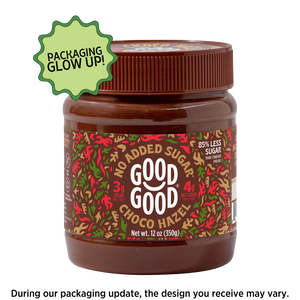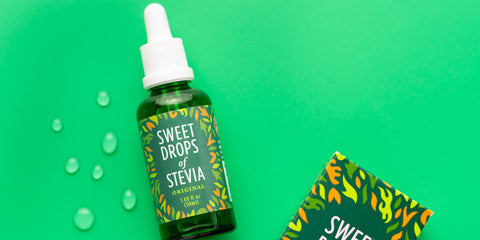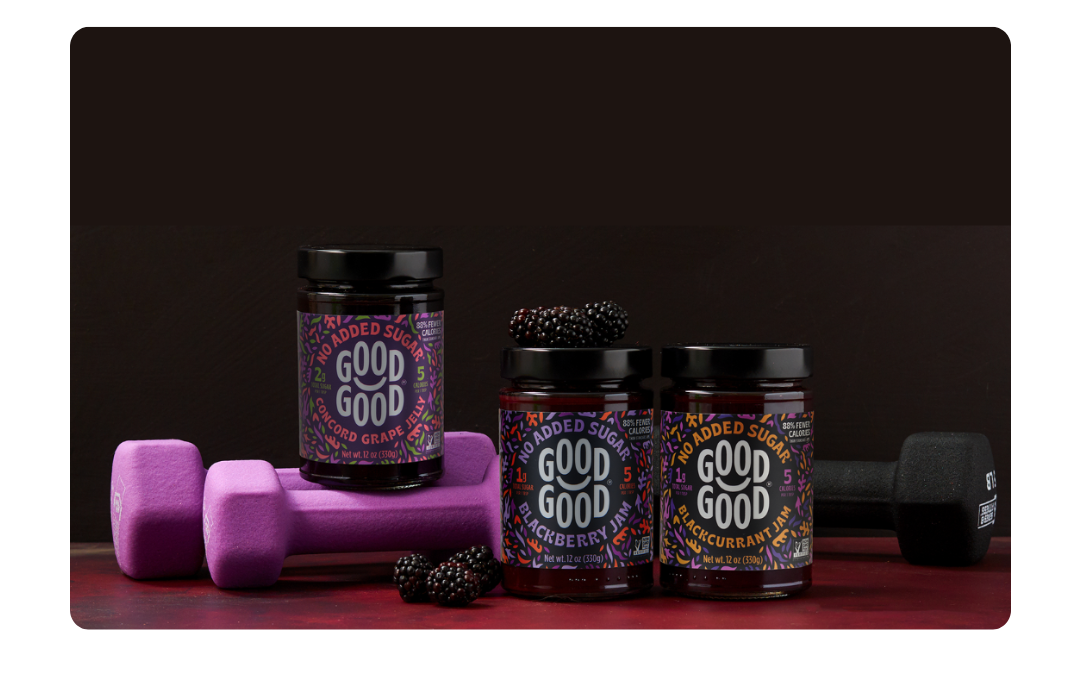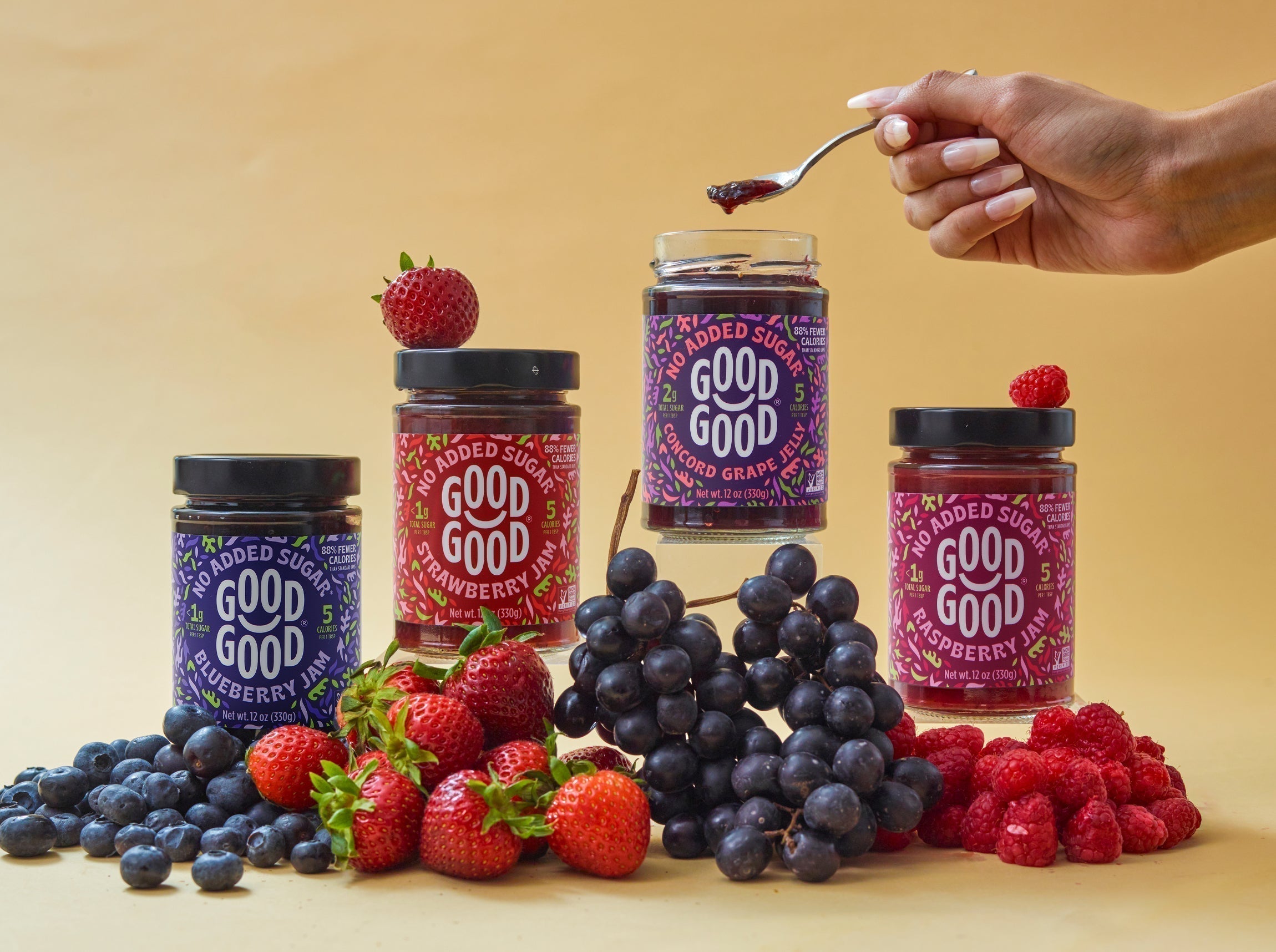In the quest for healthier alternatives to sugar, stevia has emerged as a popular choice among consumers looking to reduce their sugar intake. But is stevia healthy?
The answer is a resounding yes. Stevia is a plant-based, natural way to sweeten foods and beverages without the calories typically associated with refined sugar.
At GOOD GOOD, we harness the natural sweetness of stevia in our Sweet Like Sugar healthier sugar substitutes, stevia vanilla drops and 99% sugar free jelly and jam collection.
In this blog post, we’ll explore stevia as a healthy option for those seeking to maintain a balanced diet while enjoying the sweet tastes they know and love.
Let’s dig in!
What this article covers:
- What Is Stevia?
- Is Stevia FDA-Approved?
- What Are the Health Benefits of Stevia?
- Stevia Safety in Certain Populations
- Can I Use Stevia in Recipes?
- Other Sugar Substitutes
What Is Stevia?
Stevia is a natural sweetener and sugar substitute extracted from the leaves of the Stevia rebaudiana plant, which is native to Brazil and Paraguay.
Unlike artificial sweeteners and processed sugar, the vanilla stevia flavor in our GOOD GOOD products has zero calories, making it an ideal choice for weight management and for those monitoring their sugar intake.
Our findings show that the sweet compounds in stevia, mainly stevioside and rebaudioside A, are responsible for its sweetness, which can be up to 300 times sweeter than sugar.
This potent sweetness means that a little goes a long way, allowing you to create delicious products without the health drawbacks of added sugars. It’s also incredibly versatile in numerous diets, making it the best sweetener for keto diet and vegans.

Is Stevia FDA-Approved?
The U.S. Food and Drug Administration (FDA) recognizes the purified form of stevioside, known as steviol glycosides.
Drawing from our experience, it’s been classified by the FDA as Generally Recognized As Safe (GRAS) for use in food and beverages.
This distinction is crucial for us at GOOD GOOD, ensuring that the stevia used in products like our vanilla stevia drops meets their rigorous safety standards, providing peace of mind for our consumers.
What Are the Health Benefits of Stevia?
Aside from its zero-calorie content, our research indicates that when it comes to stevia extract and diabetes, consumption doesn’t lead to the spikes in blood glucose levels often associated with refined sugar.
Additionally, the Journal of Medicinal and Chemical Sciences conducted a study showing that stevia has a minimal impact on blood pressure. Through our practical knowledge, this could potentially be beneficial to people with hypertension.
Stevia stands out as an excellent alternative to sugar, backed by FDA approval for its purified forms and supported by research highlighting its benefits.
Stevia Safety in Certain Populations
Table: Stevia’s Effect On Vulnerable Groups
|
Population Group |
Stevia’s Effect |
Benefits |
|
Diabetics |
Doesn’t raise blood glucose levels, making it a safe alternative to sugar |
Helps with reducing the risk of glucose spikes |
|
Pregnant Women |
Safe for use during pregnancy when consumed in moderation |
Offers a natural, calorie-free sweetening option without affecting blood sugar levels, which is beneficial for gestational diabetes management |
|
Children |
Safe when consumed within recommended limits, providing a sugar-free sweetening option |
Reduces sugar intake, supports dental health and prevents obesity |
Diabetes
As a natural sweetener with minimal calories and carbohydrates, stevia doesn’t raise blood glucose levels, making it a safe and attractive option for people with diabetes.
This is particularly evident in our 99% sugar free orange marmalade. After trying out this product, it’s sweetened with stevia, which accounts for 1g of its total sugars.
Moreover, it contains 50% of oranges and rowanberries. These fruits are rich in vitamin C, which reduces blood glucose and improves insulin resistance in diabetics as well.
Pregnancy
Pregnancy demands careful consideration of dietary choices to ensure the health and well-being of both the mother and the developing fetus.
Due to its natural origins and the approval of high-purity stevia extracts by health authorities, moderate consumption of stevia during pregnancy is considered safe.
However, as with all dietary supplements during pregnancy, we recommend consulting with a healthcare provider before incorporating stevia into your diet.
At GOOD GOOD, our priority is the safety and health of all our consumers, including expectant mothers.
Children
Given its nutritional value, stevia is a preferable choice for children's diets, helping to reduce the intake of sugars while still satisfying their sweet tooth.
It's important, however, to focus on a balanced diet that limits added sugars of all types, ensuring children receive a wide range of nutrients for healthy growth and development.
At GOOD GOOD, we believe in providing healthier choices for the whole family, including our younger consumers.
That’s why you can’t go wrong with using our Sweet Like Sugar sweetener to make your children keto-friendly snacks like our popular rainbow cookies. Simply add any flavor from our 99% sugar free jelly collection to make the delicious filling.
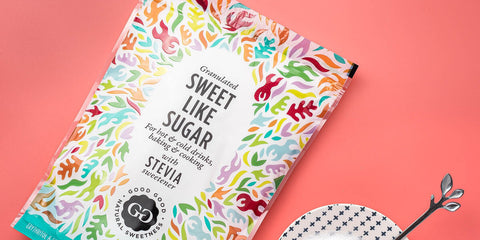
Can I Use Stevia in Recipes?
Stevia is incredibly versatile and can be used in a wide range of recipes, from sweetening beverages to baking.
For instance, you can use our vanilla stevia to make refreshing iced coffee or a delicious BBQ sauce for chicken.
After putting it to the test, the heat-stable nature makes it suitable for cooking and baking as well. Keep in mind that it's sweeter than refined sugar, so adjustments in the quantity may be necessary.
Other Sugar Substitutes
While stevia is a fantastic option for many, it's not the only sugar substitute available.
There are other all natural sweeteners, which include:
- Erythritol: A sugar alcohol with almost no calories, erythritol doesn't spike blood sugar or insulin levels, making it a diabetic-friendly choice. You can find it in products like our sugar free grape jelly.
- Xylitol: Another sugar alcohol, xylitol is low in calories and can reduce the risk of dental cavities.
- Monk Fruit Sweetener: Derived from the monk fruit, this sweetener is calorie-free and much sweeter than sugar. Like erythritol or xylitol, it doesn’t affect blood sugar levels either, making it suitable for diabetics and those watching their calorie intake.
While these are excellent sugar substitutes and diabetic friendly sweeteners to boot, stevia still reigns supreme overall for its natural properties and zero-calorie profile.
This makes it a preferred choice for those looking to maintain a healthy lifestyle while enjoying delicious sweeteners and spreads.
At GOOD GOOD, we've chosen stevia followed by erythritol as the best healthy sweeteners, reflecting our commitment to ingredients which benefit your health.
Conclusion
Throughout this article, we've explored the various facets of stevia, from its health benefits to its safety in specific populations, and how it can be incorporated into your everyday meals.
The evidence is clear: stevia isn’t just safe but also offers significant health advantages, making it an excellent alternative to sugar.
At GOOD GOOD, we're proud to offer a range of products sweetened with stevia. This allows you to enjoy the sweetness you love without the negative health impacts associated with processed sugar.
So, what are you waiting for? Experience the delicious taste of our GOOD GOOD products sweetened with stevia flavors and make a positive change in your dietary habits today.
If you want to learn more, why not check out these articles below:
- Is Stevia Keto?
- Healthiest Sweetener for Coffee
- Best Jelly for PB&J
- Best Grape Jelly
- Peanut Butter and Jelly Alternatives
- Red Currant Jelly Alternative
- Most Popular Jelly Flavor
- Best Grapes for Jelly
- How Much Sugar Is in Jelly?
- Is Grape Jelly Gluten Free?
- Is Jelly Gluten Free?
- Is Jam Gluten Free?
- Is Orange Marmalade Gluten Free?
- Is Sugar Free Jelly Good for Diabetics?
- Is Sugar Free Jelly Good for You?





![[title] Reforestation Donation by Dollar Donation Club sold by US GOOD GOOD®](http://goodgoodbrand.com/cdn/shop/files/DollarDonationClubShopify_1_300x.jpg?v=1712681952)
